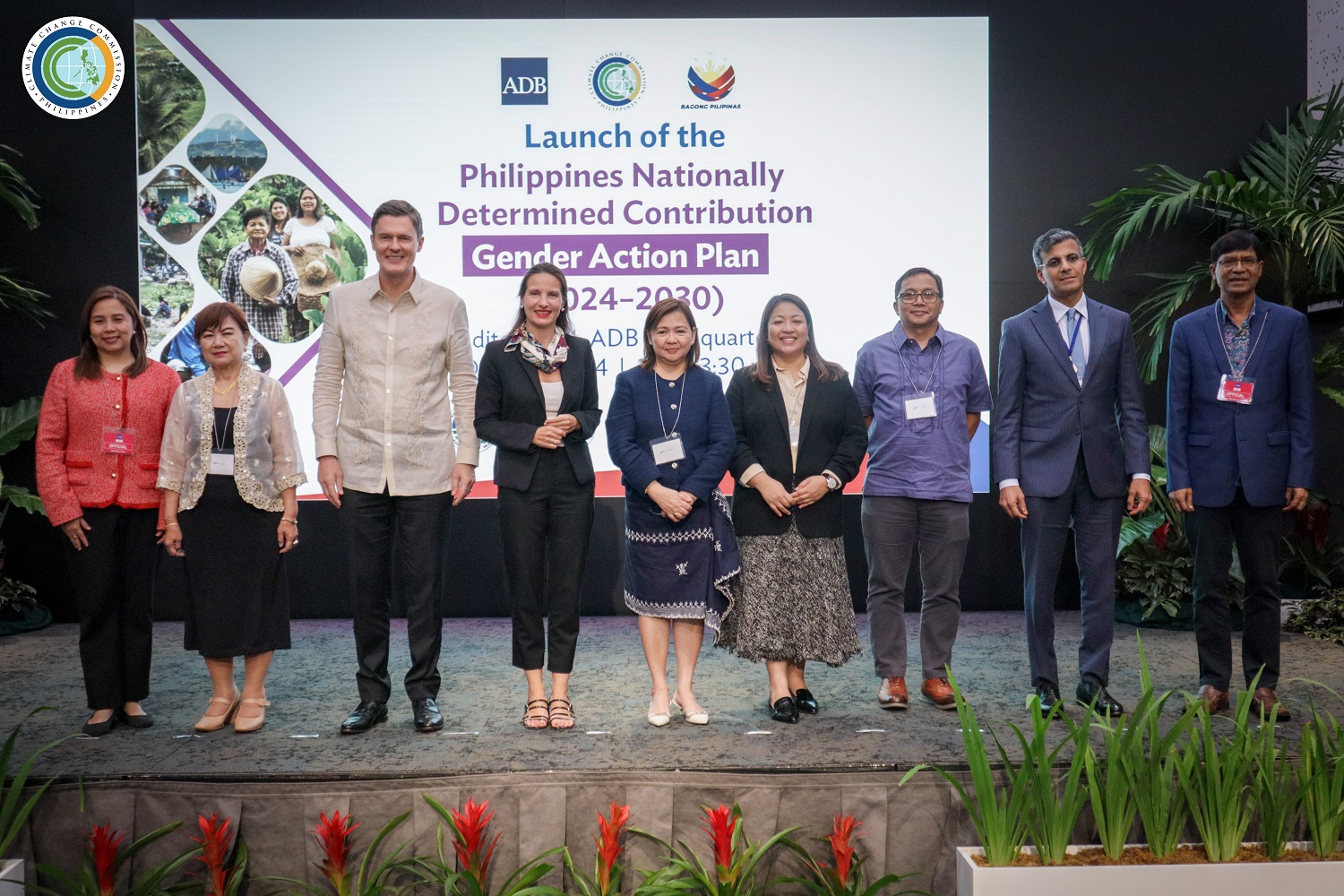
October 09, 2024 Wednesday

From left to right: Annray Villota-Rivera (Department of Agriculture), Chairperson Ermelita V. Valdeavilla (Philippine Commission on Women), Director General Winfried Wicklein (Asian Development Bank), Ambassador Marie Fontanel (Ambassador of the French Republic to the Philippines), Undersecretary Analiza Rebuelta-Teh (Department of Environment and Natural Resources), Commissioner Rachel Anne Herrera (Climate Change Commission), Director Michael O. Sinocruz (Department of Energy), Pavit Ramachandran (Asian Development Bank), Selva Ramachandran (United Nations Development Programme)
MANILA, PHILIPPINES (7 OCTOBER 2024) — The Philippines’ Climate Change Commission (CCC) has launched the Gender Action Plan (GAP) of the country's Nationally Determined Contribution (NDC) 2024-2030, signifying the country’s deep commitment towards gender-responsive climate action. The plan, adopted for the agriculture, energy, waste and industry, and transportation sectors, was developed through technical assistance from the Asian Development Bank (ADB) and United Nations Development Programme (UNDP), and will be rolled out with support from the Agence Française de Développement (AFD).
The Gender Action Plan is aligned with the country’s Nationally Determined Contribution (NDC) and its Implementation Plan (NDCIP), with the latter finalized under the current administration of President Ferdinand R. Marcos Jr. Consistent with President Marcos’ vision for inclusive, resilient, and sustainable development, the NDC Gender Action Plan ensures that gender considerations are central to the Philippines’ efforts to reduce or avoid greenhouse gas emissions by 75% and increase the share of renewable energy to 35% by 2030 and 50% by 2040.
“ADB is pleased to work with the Government of the Philippines to integrate gender equality in climate change strategies and programs. While evidence shows that women are disproportionately affected by disasters and climate change impacts, they have limited opportunities to participate in the decisions that affect them or to lead climate responses,” said Winfried Wicklein, ADB Director General for the Southeast Asia Regional Department.
The Asia and the Pacific region are building momentum in recognizing the importance of gender equality in climate action and implementing concrete measures to achieve it. As of 2023, 37 out of 49 countries with NDCs acknowledge the interlinkages between gender and climate change.
“Our Gender Action Plan resolves that, first, greenhouse gas reduction efforts will ensure women are less disproportionately impacted by climate change; second, financial assistance will be equitably distributed and prioritize those most vulnerable; and finally, economic gains, improved security, and resilience will be enjoyed more equitably across all communities," said DENR Secretary and Official Representative of the President in the CCC, Maria Antonia Yulo-Loyzaga.
The NDC Gender Action Plan is a landmark achievement as the Philippines now joins the ranks of countries on a clear path towards gender-responsive climate policy implementation. The Agence Française de Développement (AFD) plays a key role in providing critical operational and technical assistance for its successful implementation.
“Climate change is a cornerstone of French diplomacy, and we are equally committed to advancing gender equality through our feminist foreign policy. This is why France proudly supports the Philippines’ NDC GAP by providing technical assistance to the CCC through AFD,” said Her Excellency, Ambassador Marie Fontanel, Ambassador of the French Republic to the Philippines.
In March 2024, AFD signed a grant financing agreement with the CCC to provide 255.000 euros to further advance the implementation of the NDC GAP, ensuring that gender considerations are fully integrated into climate change policies across critical sectors.
The NDC GAP ensures that policies on reducing emissions integrate gender considerations in the critical sectors of agriculture, waste, industry, transport, and energy.
The plan provides for the establishment of a Gender and Climate Change Advisory Group, customized gender guidelines for climate change adaptation and mitigation projects, capacity building and development, sex-disaggregated databases, climate and vulnerability assessments, and monitoring and evaluation.
“With this plan in place, we look forward to seeing more women equipped with the tools and knowledge to make informed decisions, access resources, and take timely climate action in their communities,” said CCC Vice Chairperson and Executive Director Robert E.A. Borje.
National Gender and Climate Change Focal Point and CCC Commissioner Rachel Anne Herrera thanked the government partners and ADB for the collaborative process that produced the NDC GAP.
“This Plan will serve to improve the capacity of gender focal points in our NDC sector-specific agencies to design and implement emissions reduction programs while addressing the inequitable impacts of climate change on women,” she said. “We look forward to seeing increased collaboration on gender integration among climate change multi-agency committees and councils, and enhanced GAD strategies and gender actions to address climate change.”
“I also want to commend the efforts of the various sectors involved and their commitment to driving the NDC GAP forward,” Herrera further noted.
The Department of Agriculture, Department of Energy, Department of Environment and Natural Resources, and Department of Transportation affirmed their commitment to the NDC GAP and will supervise the progress of its implementation.
Chairperson Ermelita V. Valdeavilla of the Philippine Commission on Women capped the event by emphasizing, "The GAP NDC is not just a plan; it’s a call to arms for collective action wherein everyone commits to roll up their sleeves and work together for a sustainable future."
Overall, the launch event aims to celebrate and raise awareness of this landmark framework, demonstrating the Philippines’ deep commitment to gender equality and climate action.
For more information on the CCC’s climate mainstreaming activities, visit www.climate.gov.ph and www.facebook.com/CCCPhl.